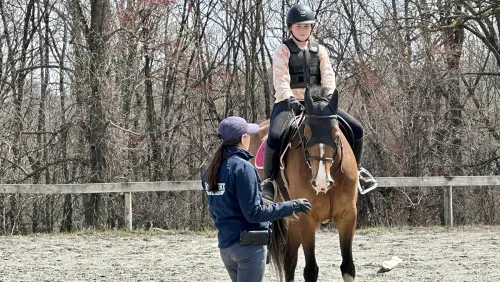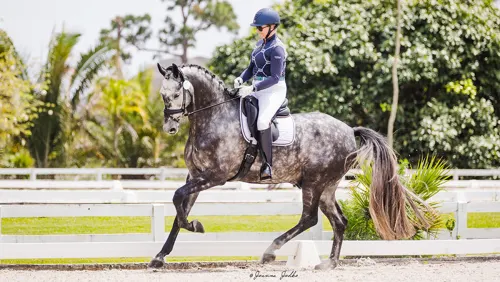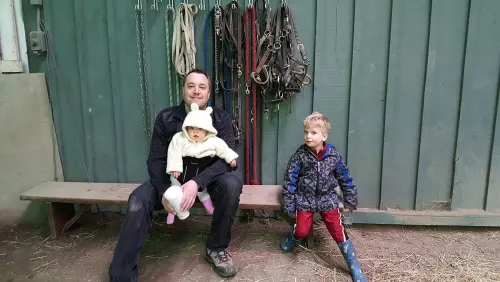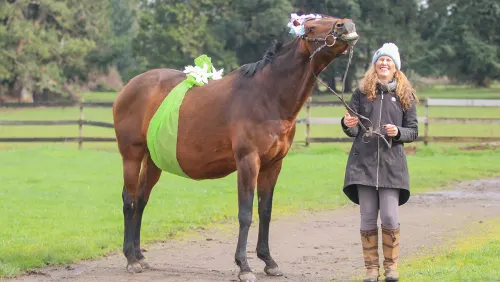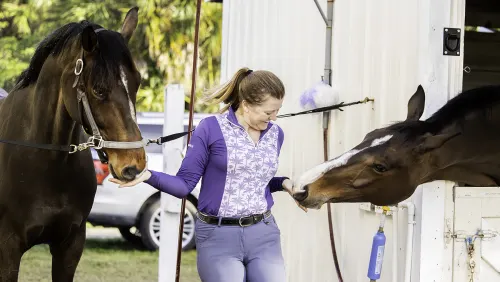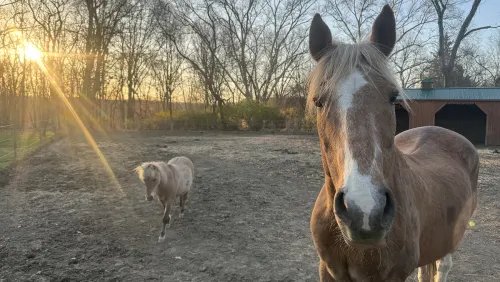Dear Rita,
After Mr. Schultheis told me that he had sent two horses home in order to make room for mine, I was left staring dumbfounded at his front door. One would think that this moment would be full of ecstatic joy for me, and it was, but the joy was fleeting.
“Wow. Willi Schultheis actually said that I could train with him?” quickly dissolved into a moment of complete sobriety. I realized that my life was going to be a little bit different from then on. It was time to get serious. This was my chance. Either I had to rise to the occasion, or I would fail. There was no turning back.
And there were a few sticky details to take care of.
I would have to tell my trainer that I was not only leaving, but also moving to his neighbor’s stable. Please understand, Rita, this is something that is simply NOT DONE in Germany—even I knew that. Riders do not trainer hop.
Also, this man had been very good to me. I LIKED him, even if I wanted to learn a different style of riding. He had given me an opportunity to train in Germany; his family had invited me for meals at home; they had made sure I had decent accommodation; I was well looked after. Crickey, I didn’t know what to say to him, and whatever I decided upon, it would have to be done either with an interpreter or in my lousy German.
I turned to my ever-funny Italian friend and comrade in crime, Giuseppe Utili, for help. Giuseppe had arrived a few days after I had in Warendorf to train out of the same stable. He had an incredibly strong Italian accent, a characteristic Italian approach to life and an unlimited sense of humor.
I met him on his first day in Germany in one of the outdoor arenas at the DOKR. Early mornings not being Giuseppe’s strongpoint, I had already ridden my second horse when he came strolling in on his horse for a lesson. I introduced myself and then asked, “Are you the Italian we have been expecting?” He replied with, “Si. And if you are the American, why you no speak English with me?!” I had to explain to him that I was the native English speaker, and therefore it was his accent that we would have to work on.
In any case, Giuseppe and I became fast friends. He asked me if I spoke German. When I replied in the negative, he confirmed the same. When I asked him how he expected to learn from our trainer who taught only in German, he responded by pulling a mini-sized Italian-German dictionary out of his riding vest.
A few weeks later, it was this very same dictionary that we perused for some help with my dilemma of changing stables, since I had loaned my English-German dictionary to a friend. Needless to say, translation through three languages leaves a bit to be desired.
This is what I wanted to say: “I would like to take this opportunity to train with Mr. Schultheis. He is getting older, and before he stops teaching, I would like to learn something from him.”
ADVERTISEMENT
But what my Italian friend advised turned out something like this in German: “I would like to train with Mr. Schultheis because he could die at any minute.”
My trainer was a good friend of Willi Schultheis and was immediately horrified to learn that Schultheis was sick and dying. At which point I called in an interpreter and got the message across that Mr. Schultheis was fine and well, and that I would be leaving with my horses at the end of the week. Whew. That was a tough one.
So I packed up my boxes, my horses, my bicycle and my boots, and moved into the stable at Velsen 6 in Warendorf.
It was the first eight weeks in the Schultheis stable that laid out an entire system for me and gave me the basis on which I would later build my own training method. I kept a diary during that time and wrote down the major points that I was learning. What still fascinates me today is that I could then and can still now, capture the essence of the Schultheis training system in two written pages.
Schultheis’ approach to riding was simple and direct. It mostly revolved around creating as much impulsion as possible behind the saddle, riding that impulsion through the neck into an elevated poll and learning how to half-halt without using the contact to destroy the forward tendency. Flexion and bend came out of altering straightness without riding backward…
Ahhh, Rita. I have already used too many words! The analyst in me created a whole language around the few things that were actually said to me. Schultheis made a valiant effort to teach me in English in those first few weeks. His English was of course very limited, so orders were direct and not to be questioned. In fact, questions were not allowed. When we were seated on horses, we had to keep riding, no matter what.
I remember well the one time that Giuseppe (yes, he also eventually came to train with Schultheis, but that is another story entirely) stopped in the middle of a very intense training session with the one-tempi changes. The horse was Russian and belonged to a client who could never get more than three to four one-tempis in a row. Giuseppe was up to six or seven, but he couldn’t convince this horse to keep going. Schultheis was getting louder and redder and more excited every time the horse quit in the line.
After several attempts, Giuseppe pulled up in the middle of a line and panted, “But what should I do?” Schultheis leaped out of his chair and screamed, “Do? How should I know what YOU should do? I am sitting in a chair. You are sitting on the horse. YOU HAVE TO KNOW WHAT TO DO. NOW SHUT UP AND RIDE!”
Mr. Schultheis always made us think for ourselves. He gave us the rules and told us what we could NOT do, and then he made us figure out how to get the job done. The Russian horse learned the one-tempi changes very quickly after Giuseppe set his mind to the task.
I have SO MANY STORIES TO TELL! I’m going to go look for my old diary first. I’d like to publish some simple excerpts here when I get back to this subject again.
I’m Catherine Haddad, and I’m sayin it like it is from Vechta, Germany.
ADVERTISEMENT
Training Tip of the Day: Can you solve the problem by making the hind legs quicker?







